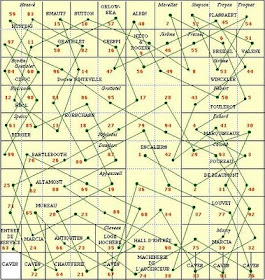About a third of the way into Life A User's Manual, I'm way enjoying Perec's storytelling virtuosity and his ability to pull the literary equivalent of a rabbit out of the hat in practically every chapter. Also excited about the apparently random way Perec chose to sequence his stories, which on closer inspection isn't random at all. To make this more clear, here's a map I borrowed from e.r.'s barcoborracho which shows how Life A User's Manual moves throughout the apartment building at the heart of the novel to get from Chapter 1 to Chapter 99 in a series of structured maneuvers. And here are some words from Perec himself describing how he settled on this decision:
"It would have been tedious to describe the building floor by floor and apartment by apartment; but that was no reason to leave the chapter sequence to chance. So I decided to use a principle derived from an old problem well known to chess enthusiasts and known as the Knight's Tour; it requires moving a knight around the 64 squares of a chess-board without its ever landing more than once on the same square. Thousands of solutions exist, of which some, like Euler's, also form magic squares. For the special case of Life A User's Manual, a solution for a 10 x 10 chess-board had to be found; I managed this, rather miraculously, by trial and error. The division of the book into six parts was derived from the same principle: each time the knight has finished touching all four sides of the square, a new section begins... It should nevertheless be noted that the book has not 100 chapters but 99. For this the little girl on pages 295 and 394 is solely responsible [pages 231 and 318 in the English translation]." --Georges Perec, in Oulipo Compendium, p. 175
Suffice it to say that all these games, as clever as they are, wouldn't mean much if Perec's stories weren't as satisfying as they so often are. However, learning about some of the constraints Perec imposed on himself in the writing of Life and the creative solutions he came up with to work around them has made reading the novel a much richer experience for me. For more on Perec's delight in the novel as jeu, see e.r.'s rather smashing post on Life A User's Manual in Spanish here or stay tuned for my own comment on e.r.'s intertextual detective work in English later here. Voilà!

Um...wow! What more can one say? I was already feeling super-grateful for the map of the apartment building that's included in the book, because my ability to visualize spatial relationships from text is way sub-par. But this takes that to a whole new level!
ResponderBorrarYou're right, though - the games & jokes are lovely, but without a truly compelling storytelling style, none of it would be compelling. Luckily, I'm finding a lot to love in that respect as well.
Though I have to say, Zola + Perec = very odd reading combo!
Amazing! This is almost like cooking when you use the best ingredients to create something unforgettable. You might not see all the pieces that constructed the whole but if they were missing, the product would not have the same finesse, richness.
ResponderBorrarUnlike Emily's odd reading combo, I seem to have found perfect partners in Perec, Dostoevsky and Proust. Language feast! Playfulness galore!
*Emily: Yeah, the French map's way cooler than the one in the Godine translation as far as visualizing as all that orchestrated chaos! Zola just came up in my Proust reading the other day as a leading Dreyfusist/Dreyfusard, so I've decided that ALL reading is related once again, ha ha.
ResponderBorrar*Frances: Glad you and Emily got a kick out of the visuals! Like your cooking analogy--esp. since you do seem to be partaking of a language feast this month with all these wordsmiths you're taking on.
Cool! But he cheated!(65-66)
ResponderBorrarI didn't want to read this post till I'd gotten a bit of a handle on this book in my own way. I'd actually started mapping when I got to chapter 3 to better visualize the building, only to find the map at the back later.